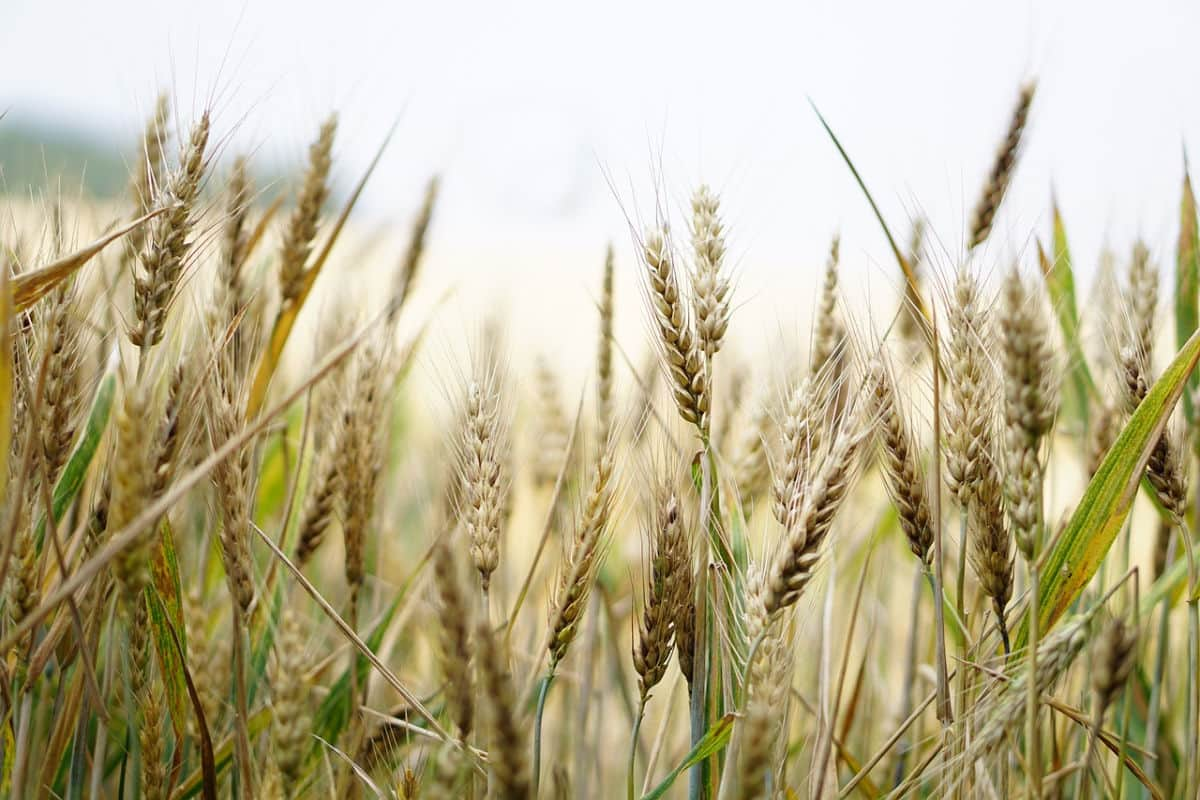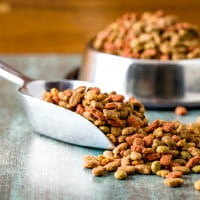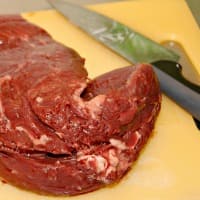FYI: If you buy something through a link on this site I may earn a commission - at NO extra cost to you.
Grain Free Dog Food
Grain-free dog food formulas are just one of the many different types of food available to us, and for some dogs it can be a good choice, but the majority of dogs do not need to abstain from eating grains.
A dog food that contains grain (as long as it's whole, and preferably organic - NOT by-products such as husks etc.) isn't a 'bad' choice and a good quality grain, properly cooked, can proved easily digestible carbohydrates that supply energy.
So, why choose grain free dog foods? Here are a couple of reasons:
Allergies or food sensitivities. Although it's much more common for humans to have problems digesting certain grains, some dogs can experiece sensitivities or gluten intolerance too.
If your dog has allergies looking at his diet can be the first step in finding the cause. Chicken, beef and turkey are the most common allergy triggers in dog food, but corn and wheat have been found to cause problems for for some dogs.
Dairy products, eggs, chemical additives/preservatives can all also trigger allergies.

Dogs don't naturally eat grain? True, at least they don't generally snack on grain directly.
The theory that our dogs should eat ingredients that are biologically appropriate, which makes sense, but dogs do ingest some grain/greens when they eat naturally caught prey.
Dogs can't digest grain easily. This is true, of some types of grains.
Because a dog's digestive system isn't built to break down complex carbohydrates grain can sometimes cause digestive upsets and results in larger, softer and often more frequent stools.
However, some grains are more digestible than others and are also good sources of nutrition, these include the ones mentioned in the container block below.
Gluten-free does NOT necessarily mean grain-free
Some gluten free dog food formulas include grain which does not contain the protein gluten.
Grains which are gluten-free include rice, quinoa, buckwheat and millet.
Rice (wild, white and brown) doesn't contain gluten, but check packaging to be sure it says 'gluten-free' as many times rice is processed in facilities alongside grains which DO contain gluten and can become 'contaminated' that way.
Benefits of Grain Free Dog Food
For some dogs there are benefits to a grain free diet and if your dog does have a sensitivity to a specific grain, or grains you may notice some of these benefits when you switch to a grain free food:
- Healthier skin and coat
- Less shedding
- Fewer ear infections
- Less gas
- Smaller, firmer, less frequent stools
- Increased energy
- Better weight regulation
Dogs who are gluten intolerant, have allergies, experience digestive upsets or have arthritis or other joint inflammation may show improvement once grain is removed from their diet.
If your dog has diabetes he may do better on a grain free dog food because a grain-heavy diet can cause inflammation and upset insulin production BUT please don't change a diabetic dog's diet without consulting with your own veterinarian first.
It's very important to keep complex carbohydrates in your dog's diet if he has diabetes and your vet is the best person to help you move away from grain based foods safely.
Choosing The Right Food, Brand & Formula
You're pretty quickly going to notice that there are a LOT of different options in terms of ingredients and grain free formulas for you to choose from.

beware of some Grain free dog food ingredients
The FDA is looking into evidence that suggests some of the ingredients used in place of grains in grain-free dog food formulas have the potential to cause heart problems.
As of now, specific ingredients suspected of causing Dilated Cardiomyopathy (DCM) include peas, lentils, beans and potatoes.
While small amounts of these ingredients may not be problematic, grain free foods which contain several, or high amounts, of them are best avoided. Research is still ongoing.
DCM can lead to potentially serious heart issues including enlargement of the heart and heart failure.
If you're exploring the grain free dog food route because your puppy or dog is showing signs of allergies, the simplest way to start is to pick a food that doesn't contain ANY of the ingredients your pup has eaten before.
This should give you a 'clean slate' in terms of diet to work with. But it could take up to 6 weeks for any symptoms related to his previous diet to fade away, so you need to be patient.
Allergies don't generally occur at the first exposure to an allergen, but rather build up over time as the levels build up in his body.
This is the reason that many of these foods are made from more 'exotic' ingredients such as fish, duck, rabbit and so on.
Your pup may well be allergic to wheat/corn or another grain, but often puppies or dogs with these type of sensitivities can react to more than one thing, so by sticking with less commonly used ingredients the chances of him tolerating the new food is higher.
Take into account your dogs age, breed and size. There are grain free foods for puppies, seniors, all-life stages and so on, so choose wisely.
There are some pups and dogs where you need to be extra-careful when looking at this type of diet.
Large breed puppies need a very carefully controlled level of protein in their diet to prevent bone/joint problems, and many grain-free formulas are high in protein.
However, not ALL of them are, pay attention to the ingredient list and look at the % of protein, starch and fat.
If your dog has kidney or renal problems, don't change over to a grain-free dog food without checking with your vet first to make sure it will suit him and be safe.
Choosing Grain-free Dog Food
As with all types of dog food, some brands are better than others, and it can be difficult to know which one to choose for your dog.
With grains or without, when looking for a dog food it's important to choose one with:
- High quality source of protein (real meat, not by-products or meal)
- Whole, natural ingredients
- Avoid additives, fillers and chemicals
Also, if possible choose a formula that doesn't contain peas, beans, lentils or potatoes... or at least one which has as small a percentage as possible of these ingredients.
A couple of options you might like to check out, and which contain minimal amounts of peas, lentils and legumes, include:
- Stella & Chewy's Wild Red dry dog food raw blend
- Health Extensions Chicken & Brown Rice dry dog food
- Nature's Logic Dry Dog Food
- Diamond Natural's Extreme Athlete dry dog food
you might also like...
- Home
- About Dog Food
- Grain Free Dog Food
FTC Disclosure: Some pages on this site contain affiliate links. I may earn on qualified purchases.





